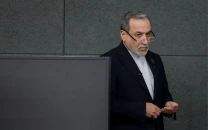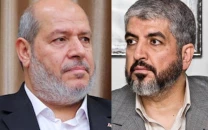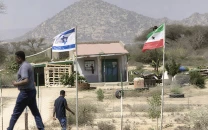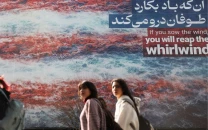Pakistan-bashing and the Awami League
The Awami League, it seems is determined to keep using 1971 as the political staple for its followers.

The writer is the Executive Director of the independent Centre for Research and Security Studies
Sharfuddin Abu Tawwamah (RA) and Hazrat Shah Ali Bagdadi (RA) are a couple of other strongly entrenched symbols of Sufism in Bangladesh.
But what one perceives and hears while being in Dhaka hardly reflects the Sufi tradition. In fact, the conduct of certain segments of the politically polarised society in Bangladesh essentially seems to run counter to the Sufi principles of compassion, peace, forgiveness and selflessness. On the face of it, the green colour — symbolic of Islam and the Sufi tradition — remains very much alive in Bangladesh.
Hasina Wajid, the prime minister, told a gathering of scholars in Dhaka on March 24 that “the government would stick to the Meesaq-e-Madina (The Madina Charter)”.
The Awami League, it seems is determined to keep using 1971 as the political staple for its followers. The knee-jerk reaction to the support of the Pakistani cricket team by some Bangladeshi fans, i.e, the ban on the waving of foreign flags clearly denied the spirit of Sufi teachings. Though the ban was withdrawn a day later, it exposed the deep-seated inherent dislike, if not hatred, of anything associated with Pakistan, particularly among the Awami League members, activists as well as those sympathetic to the party in the business and bureaucracy.
Just recall what the Awami League leadership allowed on December 22, 2013, when Ganajagaran Mancha activists practically marched on the Pakistan High Commission in Dhaka, almost besieging it, as the police found themselves constrained by political orders of ‘not being too hard on protestors.’ The protest had been organised in response to a seemingly unnecessary resolution that Pakistan’s National Assembly had passed condemning the Jamaat-e-Islami Assistant Secretary General Abdul Quader Molla’s execution order, following his conviction by a Dhaka court for crimes against humanity, including the charge of collaborating with Pakistani forces to kill 369 others in 1971 during Bangladesh’s war of independence.
Ganajagaran Mancha’s demand of the maximum punishment for all 1971 war criminals itself denies the spirit of Sufism and exemplifies those wanting revenge at all costs. The ostensible patronage of the ruling party for this movement and the conscious attempt to keep alive the “terrible echoes of 1971” through the war crime trials also contradicts the spirit of the April 9, 1974 Indo-Pakistan-Bangladesh Delhi Agreement.
Article 14 of the agreement, for instance, says that the prime minister of Bangladesh had declared, with regard to the atrocities and destruction committed in Bangladesh in 1971, that he wanted the people to forget the past and to make a fresh start, stating that the people of Bangladesh knew how to forgive. This agreement amounted to “burying the hatchet” and was supposed to have been a forward-looking step but the anti-Pakistan acrimony that keeps resonating in the Bangladeshi print and electronic media even today is quite shocking and bespeaks volumes about how sections of the Bengali political elites remain frozen in history, refusing to even heed the Father of Nation’s commitment in the 1974 Delhi Agreement. This fixation with 1971 only underscores an attempt to stoke anti-Pakistan sentiment and thus gain political mileage.
One must, however, caution that — based on conversations in the Gulf and Europe with Bengali political and intellectual elites — it is quite obvious that the other side of the political divide, led by former prime minister Khaleda Zia, remains compassionate and inclined towards moving on as far as Pakistan is concerned. Unfortunately, though, Begum Zia remains on the fringe, at least for the time being.
Published in The Express Tribune, April 2nd, 2014.
Like Opinion & Editorial on Facebook, follow @ETOpEd on Twitter to receive all updates on all our daily pieces.



















COMMENTS
Comments are moderated and generally will be posted if they are on-topic and not abusive.
For more information, please see our Comments FAQ